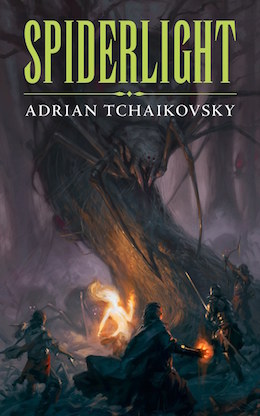I didn’t expect to fall in love with Adrian Tchaikovsky’s Spiderlight. I really didn’t: its cover copy sounds rather… well, pedestrian. Dark Lord this, forces of Light that, prophecy and band of misfits the other. It all sounds a bit familiar, doesn’t it?
Well. This is the literary offspring of J.R.R. Tolkien and Fritz Leiber, all right. But a literary descendant that looked at Tolkien’s moral essentialism, the racism baked into the structures of Middle-earth, and decided to take on the hypocrisy of heroes who believe that a being is good or bad based on innate characteristics, on hereditary, rather than on acts. Good people, who belong to the Light, are to be preserved. Bad things—because Dark people are not really people, as such, except the ones who were Light originally—are to be destroyed. Cleansed.
Are you uncomfortable with this worldview yet?
Fortunately, the heroes of this tale are not limited to just another standard-issue band of fantasy-world zealots hellbent on eradicating the Other. That all-too-familiar narrative is challenged from the start, when the first character to whom Spiderlight introduces us is Nth. Nth is a large spider, child of an innumerable brood that lives in a dark wood, ruled over by their old and hungry Mother. When five humans come into the wood, searching for a way to fulfil a prophecy to defeat the Dark Lord Darvezian, they slaughter many spiders and demand a tooth from the spider matriarch—and knowledge of the “spider’s path” that will let them get near enough to Darvezian to defeat him. This small band comprises Dion, a priestess of the Church of Armes, dedicated to the service of the Light; the extremely powerful but socially incompetent mage Penthos; the morally compromised thief Lief; the archer Cyrene; and the warrior (and sexist asshole) Harathes. Compelled by Dion’s power, the spider matriarch surrenders to their demands—and sends Nth, with the knowledge of the “spider’s path,” to travel with them.
But the heroes of the Light cannot travel accompanied by an obvious Dark monster. So the mage Penthos transforms Nth into the form—sort of—of a man, with human speech and understanding of human concepts. None of the “heroes” asks Nth what he thinks of this, of course—to them he isn’t even a person. But as their journey continues, the reader’s sympathies rest strongly with Nth. Forced into a strange shape, forced on a strange journey, surrounded by pain and by strangers, and expecting only more pain and death to be his rewards, Nth is who and what he is, and that is not inherently evil.
Yet it’s hard not to sympathise with Dion and Penthos and Cyrene and Lief, too. (It is very hard to sympathise with Harathes. Poor sexist racist asshole. Not.) They are very human characters, with all the flaws that entails, given a really hard task to complete. The narrative recognises the hypocrisy of the culture that produced them, and as the story rolls along—complete with encounters straight out of the very best sword-and-sorcery, including an encounter with a subset of the Church of Armes that includes theological debate, stabbing, and MASS BLUDGEONING; more spiders; suspicious innkeepers; and extremely competent sarcastic commanders of border posts—many of the characters come, slowly, to recognise the hypocrisy of their worldview, and to feel a certain amount of shame.
And then they meet the Dark Lord, and find the entire foundations of their world shaken.
Spiderlight is an excellent novel. It successfully treads the narrow line between humour (it occasionally tends towards the satirical) and seriousness: there are moments that pack an incredible punch, in terms of emotional weight. To take one example, it approaches the issue of sexual consent from several angles over the course of the story. It doesn’t gloss over the importance of free consent, of autonomy, and it doesn’t give a pass to characters who violate it. (That’s still insufficiently common to be worth remarking.)
It’s got great pace. Its characters are compelling. It has some serious ethical arguments to make. It’s got amazing action scenes. And it’s startlingly fun.
I’m not entirely convinced that the conclusion hangs together, even if it was a twist I wasn’t expecting. But Spiderlight as a whole entertained me so well that I’m not sure I care.
Spiderlight is available now from Tor.com Publishing
Read an excerpt from the novel here on Tor.com
Liz Bourke is a cranky person who reads books. She holds a Ph.D in Classics at Trinity College, Dublin. Find her at her blog. Or her Twitter.










